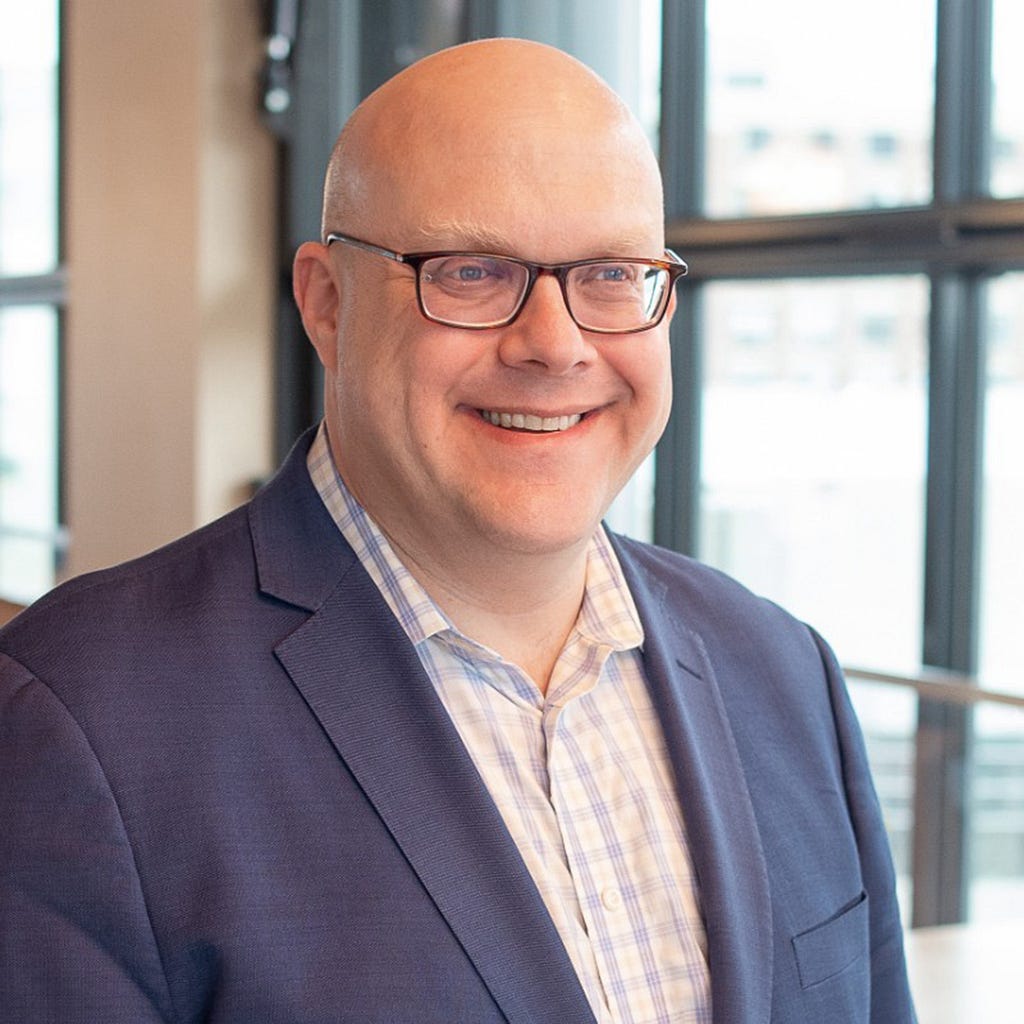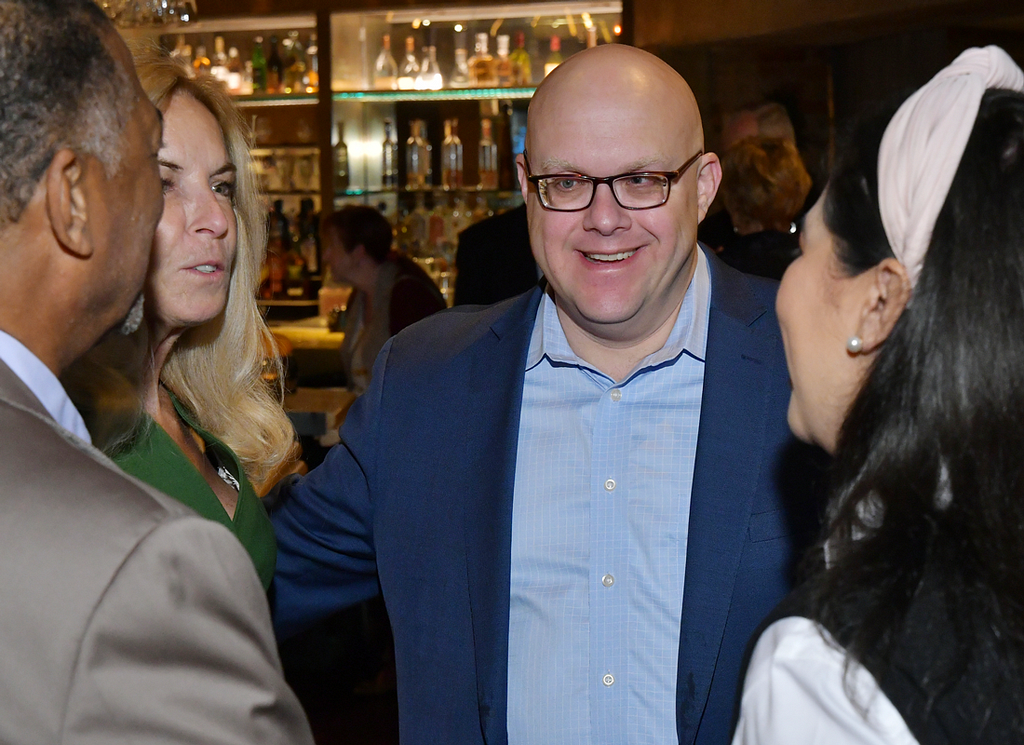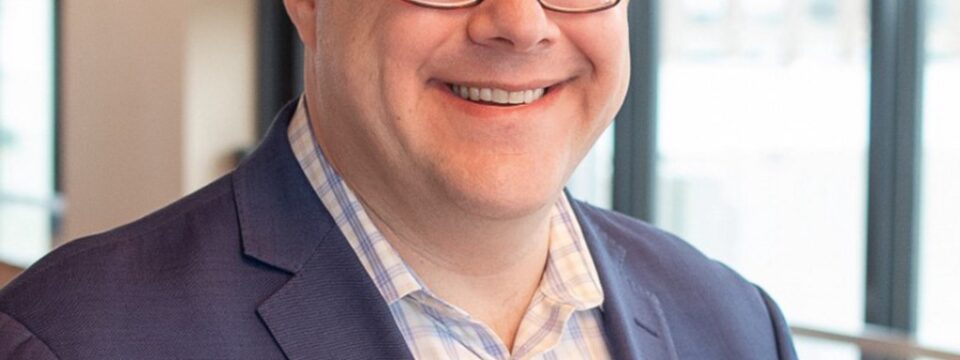
Ensure there is more equity in K-12 education. Right now the kind of resources and opportunities afforded to our youth is not equal, and it is systemic. How schools are funded is unequally built into our laws — an example being using property taxes to fund schools. But beyond that, access to housing and health care is unequal, as are the academic resources afforded to the economically privileged that are provided by family and community. The solution is not funding education the same regardless of zip code, but instead investing more resources in economically disadvantaged communities to make up for the lack of resources in other places. If the goal is equality of opportunity, much work needs to be done.
As a part of my interview series about the things that should be done to improve the US educational system I had the pleasure to interview Steve Stein of Thrive Scholars.
Steve Stein (he/him) joined Thrive Scholars as the founding Boston Executive Director in February 2016 and became Chief Executive Officer of the national organization in 2017. He is a Boston-based nonprofit executive known for strategic organizational growth. Steve holds a B.A. in history and philosophy from Emory University and a Master’s Degree in Education from the Harvard University Graduate School of Education. He lives in Massachusetts and enjoys playing softball, golfing, and spending quality time with his six-year-old son.
Thank you so much for doing this with us! Our readers would love to “get to know you” a bit better. Can you share the “backstory”behind what brought you to this particular career path?
I was a high school teacher for ten years in Atlanta and Chicago. Debate was always a huge part of my life: when I was a teacher, I was also a debate coach. When I was in high school, I was a debater, and in college, I volunteered with the Atlanta Urban Debate League. For those unfamiliar, The Atlanta Debate League was the first nonprofit to bring debate to urban schools in Atlanta. Prior to that, you would find most debate teams in suburban or private schools. There are amazing academic benefits to debate, and I wanted to bring this opportunity to more students.
In my last year of teaching at Evanston Township High School in Evanston, Illinois, Boston wanted to start its own Boston Debate League for their public schools. I was approached by contacts looking to bring the program to Boston and asked if I wanted to run it. At first, it wasn’t something I had on my radar; I wasn’t thinking about my career trajectory beyond teaching. But the more I thought about it, I realized I really believed in the academic benefit of debate, and that if I did something like this, I could have a larger impact on a much larger group of individuals. I took the plunge and moved to Boston to run a nonprofit having no idea what it meant to be an Executive Director. I had no idea what development meant in the context of fundraising. I had never used Excel before. Needless to say, I had a lot to learn!
Can you share the most interesting story that happened to you since you started your career? Can you tell us what lesson you learned from that?
When I made the transition from being a high school teacher to an Executive Director at a nonprofit, I had no idea what I was doing. For example, the first budget I created was made in Microsoft Word because I had never used Excel–not to mention it was for the wrong fiscal year. During the meeting I had prepared for, I was answering questions and my answers didn’t make sense. A board member recognized that because of my background, I didn’t yet have a firm understanding of these concepts and helped me get comfortable with how to present budgets in the future.
The career change was a huge transition for me. One of the things I learned was that mentorship and learning those best practices from leaders in my role was incredibly valuable. I made it a point in the following year to reach out to and meet with 3–5 Executive Directors of nonprofits that were a little bit bigger than the organization I worked at the time. I found that speaking to those individuals helped me tremendously with my professional development throughout the years.
Are you working on any exciting new projects now? How do you think that will help people?
We’re very proud of the fact that as a nonprofit, we were serving 100 students per year about 3 years ago, and now we’re serving around 300 students a year. While our impact has been substantial, there are tens of thousands of students that fit the academic profile of those our organization is trying to help.
Last year around this time, we asked ourselves if there is a way that we could take what we’re doing and scale to the size of the problem. After months of planning, we embarked on a plan to help go from serving around 300 students per year to over 2,000 annually. As more students are able to go through this program, I believe that has the ability to lead us to a place where we have some leverage and can really start making changes to broader systemic issues–whether it’s how high schools are preparing their students for top colleges or how top colleges are preparing their students for success in their future careers. This work also has the ability to change how companies prepare to bring in a new cohort of diverse students from low-income backgrounds.
Can you briefly share with our readers why you are an authority in the education field?
Different experiences make different people authorities in many different ways. Through my background as a high school history teacher and debate coach, I gained unique insight into the US education system. Then through my role at the Boston Debate League, my experience was broadened. I’ve learned a lot along the way from my own experiences, the schools and the teachers, our Scholars’ experiences, admissions officers, Executive Directors at other nonprofits, etc. I take an always learning approach, always believing we can do better.
I’ve drawn on my diverse experiences to lead the transition of a Los Angeles-based initiative, South Central Scholars, into a national nonprofit rebranded as Thrive Scholars in 2020 and played an integral role in expanding operations from a budget of $2M to $16M and a team of 6 to nearly 70 serving over 800 Scholars nationally. Under my leadership, Thrive Scholars advanced its in-depth career programming, offering programs that supports students interested in high-trajectory career industries such as law, technology and engineering, life sciences, finance, business, and consulting. I’ve also helped grow the organization across the country with the addition of regional hubs in Chicago, Cleveland, and New York City.
Ok, thank you for that. Let’s now jump to the main focus of our interview. From your point of view, how would you rate the results of the US education system?
Unfortunately, pretty poor. There are some significant achievements in some places, and in some places the education is very strong. However, education can’t be strong for just some and not for others, and we can’t be content with that. Talent is distributed equally, but opportunity is not. That very much applies to education in this country. You see data point after data point–50% of Black students in this country attend a school that does not provide calculus. Grades, test scores, how students perform when they get to college, etc. all suffer in communities without equal opportunity–so much inequality exists in education. Education offerings to students varies so much based on their zip code, and when there is unequal opportunity, I don’t understand how anyone could argue that it’s strong.
Can you identify 5 areas of the US education system that are going really great?
There are pieces of the education system that are working. For example, we have some of the best colleges and universities in our country and with their resources, the quality of that education is very strong. Between schools and nonprofits, there are engagement efforts that are working getting more students excited and interested in STEM. I’ve also seen an increased focus on data, allowing schools and districts to make better, more informed decisions about individual student needs. Finally, schools also continue to improve their social emotional learning and wellness curriculum. While there is still a great deal of room to grow in this area, the need for this type of programming has become widely accepted and efforts/investments continue to grow.
Can you identify the 5 key areas of the US education system that should be prioritized for improvement? Can you explain why those are so critical?
The first one is unequal and inadequate funding in education. Based on what zip code they reside, students are offered varying levels of resources. This in turn starts students off in a position where they’re not always equipped with the foundational skillset they need in order to be successful. The second is how we respect and pay our teachers — especially during this time. The third is academic rigor, especially in quantitative and writing foundations. The fourth key area is exposure to wealth building careers for our low-income students of color. Many students who graduate with good grades have never heard about the wide range of corporate career options or have the networks or skills to thrive in that setting. Finally, lack of access to college counselors which can lead to students who don’t even apply to a top school, even if they’re high performing.
How is the US doing with regard to engaging young people in STEM?
When it comes to the question of engaging, the US isn’t doing too bad. There are a ton of programs and initiatives in this country, both in the school systems themselves and in the nonprofit/philanthropic space related to engaging students in STEM and garnering interest, and they’re working. If engagement is the metric of success, I actually think we’re doing a pretty good job.
The problem is for STEM careers and majors in college, there are skills needed for students to persist and succeed. Oftentimes, they’re going to schools that don’t offer the academic rigor to develop those skills, so when 80% of Black and Latinx students leave their STEM major once they enter college, the initial success isn’t helpful.
All too often, America’s high-achieving students of color from disadvantaged communities experience an opportunity gap. Though these high school students have the talent, grit and motivation to thrive in top colleges and fulfilling careers, they face systemic barriers to achieving this level of success, rooted in societal inequalities.
At Thrive Scholars, we know that by starting earlier than college, in the junior year of high school, and providing the same support before, during and after college that privileged students often receive, we can help these students become the next generation of diverse leaders our nation needs. Thrive Scholars benefit from tailored academic preparation, mentorship, financial and career counseling, and emotional-social support. And the results prove that this approach works.
- Thrive Scholars boast an average college GPA of 3.4; 85% above a 3.0.
- At the top 100 schools, Thrive Scholars are 10% more likely to graduate and 25% more likely to persist in STEM majors than students of all backgrounds.
- 75% of Thrive Scholars persist in STEM majors — 3X the rate of other high-achieving students of color from disadvantaged communities.
- Thrive Scholars have a 98% college graduation rate.

If you had the power to influence or change the entire US educational infrastructure, what five things would you implement to improve and reform our education system? Can you please share a story or example for each?
Great question. I can think of three things on how to improve and reform our education system.
1. Ensure there is more equity in K-12 education. Right now the kind of resources and opportunities afforded to our youth is not equal, and it is systemic. How schools are funded is unequally built into our laws — an example being using property taxes to fund schools. But beyond that, access to housing and health care is unequal, as are the academic resources afforded to the economically privileged that are provided by family and community. The solution is not funding education the same regardless of zip code, but instead investing more resources in economically disadvantaged communities to make up for the lack of resources in other places. If the goal is equality of opportunity, much work needs to be done.
2. Better align the education outcomes K-12 is aiming towards with the requirements of college. Too many students show up in college without the academic skills needed to be successful there. Note — we can set whatever goals we want, but until #1 is dealt with, they will likely be unachievable.
3. Better align the educational outcomes in K-16 with the skills employers are looking for, especially in economically disadvantaged communities. Note — we can set whatever goals we want, but until #1 is dealt with, they will likely be unachievable.
Can you please give us your favorite “Life Lesson Quote”? Can you share how that was relevant to you in your life?
Culture eats strategy for lunch — as someone who is running an organization this really resonates with me. You may have the best idea or program in the world but if the people working in the organization don’t feel valued or supported or don’t have the resources that they need — they won’t carry through on that mission or program and we could lose the very best ideas.
We are blessed that some of the biggest names in Business, VC funding, Sports, and Entertainment read this column. Is there a person in the world, or in the US, with whom you would love to have a private breakfast or lunch, and why?
Rather than name a person, I would love to speak with those who have scaled organizations in an equitable and inclusive way for the people they serve as well as the employees of their organization.
Thank you so much for these insights! This was so inspiring!
Steve Stein of Thrive Scholars: 5 Things That Should Be Done To Improve The US Educational System was originally published in Authority Magazine on Medium, where people are continuing the conversation by highlighting and responding to this story.
